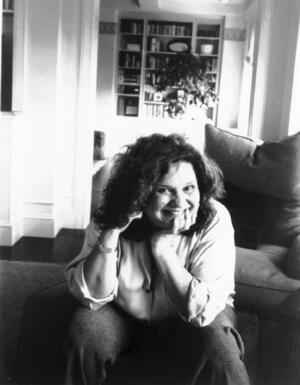Wendy Wasserstein
Most of the remembrances and reflections that have been published since the death of playwright Wendy Wasserstein on January 30, 2006 praise her for giving voice to the experience of the women of her generation. In an interview conducted last year, on behalf of the Jewish Women's Archive, by filmmaker Joan Micklin Silver, Wasserstein conveyed her deep commitment to portraying that experience. Answering questions principally about actress Madeleine Kahn's depiction of one of the sisters in her 1993 work, The Sisters Rosensweig, Wasserstein spoke to the power and responsibility of moving beyond familiar dramatic narratives and easy stereotypes.
In her Tony Award-winning performance, Madeleine Kahn played Gorgeous, a housewife from Newton, Massachusetts, who had recently taken on the identity of "Dr. Gorgeous," an advice-giving know-it-all for a Boston radio station. She is visiting her sisters in London—while serving as a tour guide for a ladies group of her fellow Temple Beth El members. Full of advice about relationships and moisturizers, Gorgeous is adorned throughout the play in uncomfortable high heels and an ersatz Chanel ensemble. In many ways, Gorgeous appears to embody the materialistic stereotype so often applied to Jewish women, yet Wasserstein has as much compassion for her struggles as for those of her more intellectual and achievement-driven sisters.
Wasserstein recalled Kahn's observation that "there are so many people in the audience who are Dr. Gorgeous. And they are always portrayed as a joke on the stage. I'm going to give that woman her dignity." Wasserstein reflected "in many ways that was also why I wrote the play." The play's climax for Gorgeous comes after receiving a gift from the Temple Beth El ladies of an authentic Chanel suit to replace her fake one. Even as Gorgeous revels in the new suit's fit and feel, she prepares to return the suit to the store for a refund. Her hidden truth is that her supposedly successful husband has, in reality, been unemployed and writing mysteries in the basement for the last few years. She cannot afford the luxury contained in what would be her greatest pleasure. Kahn strove to portray Gorgeous' decision as "an action of dignity and not just a joke." Wasserstein recalled thinking, "that's impressive. That's worth a Tony Award."
Wasserstein's own Tony, the first ever awarded to a female playwright as the sole author of a play, came for The Heidi Chronicles which was named best play of 1989. It also garnered the New York Drama Critics Circle award and the Pulitzer Prize for drama.
Wasserstein observed that she was often told by producers and others that her plays were "too New York," which she understood as being a euphemism for "too Jewish." As Wasserstein recounted, when people asked her whether The Sisters Rosensweig with its three Jewish sisters, " a hit in New York [could] play around the country," she replied "Well, you know this is something I've heard … People have sisters. Now maybe I'm wrong. Maybe they don't have them in Ohio. I could be wrong, but I've heard … they have sisters there."
In the interview, Wasserstein seemed aware of her place in a relatively thin tradition of Jewish women dramatists—she pointed only to Lillian Hellman and the lyricists, Carolyn Leigh and Betty Comden (whose work with Adolph Green included lyrics for "Bells Are Ringing" and "On the Town"). In the small world of theater, Wasserstein seemed to feel a sense of close affiliation with these predecessors, noting that both she and Comden attended the Brooklyn Ethical Culture School.
There have been other prominent female playwrights, including a few Jewish women, but Wasserstein's comments suggest how strangely alone she was as a dramatist trying to give full voice to the dilemmas and dramas of adult women. She found few predecessors and few to accompany her—only one other woman has been awarded the Tony for best play since The Heidi Chronicles. Moreover, the lack of strong roles for women is demonstrated year after year as Tony and Oscar nominations for best actress are given for roles as the wife or companion of the main (male) character. Wasserstein's legacy may yet be written in the work of those who will grasp her model of creating strong women characters and allowing them to confront the frailties and dilemmas that define contemporary life.
As the most successful female dramatist of her generation, Wasserstein might have been forgiven for enjoying the trappings that come with such recognition. Yet as attested to by almost everybody who has written about her, she remained ever modest and available and human—seemingly unaffected and unimpressed by glitz and celebrity. Martin Brody's remembrance offers an introduction to this side of Wendy Wasserstein.



